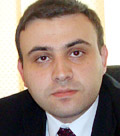In the context of relationships with the European Union the Armenian society is perhaps most interested in the economic component. It was a pretty big step to start trading with the EU with the GSP and later GSP+ mode. But later we have found out that we need more than free trade with Europe. As the head of the department of EU cooperation and international economic cooperation of the RA ministry of economy Varos Simonyan mentioned in 2007 the European Commission has conducted a survey and it was discovered that Armenia needs more than just a free trade agreement with the EU and that we need a more comprehensive and through free trade agreement. It means that the agreement should include all the spheres (trade of goods and services, investment, competition, sales) including institutional reforms. The fact-collecting mission of 2009 of the European Commission surveyed all the bodies in Armenia, which would be included in the future agreement. It also submitted its recommendations, to which Armenia should conform. As opposed to the well-spread opinion that the Armenia-EU cooperation is merely limited by institutional reforms, legislative reforms Simonyan ensures that the EU is showing a concrete support to Armenia to approach to European standards. It means that on the one hand it offers conditions and on the other hand supports their realization. “The EU also wishes to have partners, who’d be almost at the same level in the economic and institutional development aspects. This serves as an incentive for Armenia to realize reforms,” says Simonyan. In this context the idea of the consultative groups of the EU is very much signed. It became realistic for Armenia in 2008 as a result of a memorandum signed between Armenia and the European Union.
– The consultative group of the EU started its activities in various spheres in 2009. The consultants work at various ministries on order to support concrete issues and build capacities. In parallel with this the AEPLAC works, which also jointly with this group is supporting the state bodies of the RA to make the action plan more comprehensive and to conduct preparatory actions in the direction of the comprehensive trade agreement. They are serious professionals from various EU states. They have an experience of practical work during the preparatory work of their member states and in the European Commission.
– How effective is the activity of these groups?
– From our end I can say that we work quite actively and in a normal way. We have weekly meetings with the minister as well as private meetings. They are deployed in our ministry and there are no hurdles in terms of distance. It means that we work with each other almost every day.
– Besides the consultative support what other type of support does the EU show?
– There is also a technical-financial support. According to the decision of the Prime Minister, the RA minister of economy is appointed as a technical support coordinator of the European Union. The support is demonstrated in several ways. A joint work has been done with the European Commission to develop the strategy of the country. And this strategy is divided into NIPs (national indicative program). The first indicative program relates to 2007-2010 and a 98 million Euro support was anticipated. For each year the support is received a year later. So we received funding at the end of 2008. An annual financial agreement is signed with the EU a concrete direction is being chosen from the National Indicative Program. It means that the EU is showing a concrete budgetary support. They are directing this money to the budget instead of conducting a program but they are meanwhile conducting strict monitoring to see whether the money helps the development of a concrete sector. For example, the first sphere was the sector of the secondary education and the second was directed to the justice sector in 2008. This year when the envoy of the European Commission was here the NIP 2011-2013 was signed.
– Which are the key spheres of the 2011-2013 program?
– It includes democratic structures and good governance, trade and investments, social-economic reforms and sustainable development. For the purpose of the implementation of the mentioned priorities 157 million Euros will be allotted for the period of 2011-2013. 32 million out of the mentioned amount will be directed for the implementation of the program named CIB-comprehensive institutional building. Besides all this there are also other tools. For example, the TWINNING, which is anticipated for the development of capacities of concrete state bodies. There is also the short-term TAEX program, in the framework of which experts are sent to Armenia, seminars are held as well as study-visits to European states from Armenia. And there is also the SIGMA program, which is more operative. It includes limited sectors but is also an effective tool, surveys are conducted, legislative comparisons are drawn, recommendations are submitted, etc.

